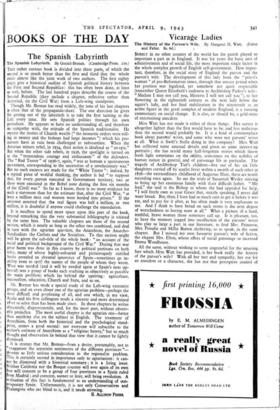The Spanish -Labyrinth
The Spanish Labyrinth. By Gerald Brenan. (Cambridge Press. 2IS.) THIS rather curious book is divided into three parts, of which the second is so much better than the first and third that the whole reads almost like the joint work of two authors. The first eighty pages give a historical outline of Spanish political history between the First and Second Republics: this has often been done, at least as well, before. The last hundred pages describe the course of the Second Republic (they include a chapter, reflective rather than historical, on the Civil War) from a Left-wing standpoint.
Though Mr. Brenan has read widely, the tone of his last chapters is often that of the propaganda-sheet. The one direction he gives for getting out of the labyrinth is to take the first turning to the Left every time. He sees Spanish politics through his own prejudices. He appears to have no understanding of," and therefore no sympathy with, the attitude of the Spanish traditionalist. He repeats the stories of Church wealth (" the monastic orders were rolling in money and the bishops had large incomes ") which his precursors have in vain been challenged to substantiate. When the Asturian miners rebel, in 1934, their action is idealised as "an epic." But when the other side rebels, in 1936, the spotlight is turned on to the "tremendous courage and enthusiasm" of the defenders. The "Red Terror" of 1936-7, again, r was at bottom a spontaneous movement, corresponding to the necessities of a revolutionary war." But no such excuses are made for the "White Terror ": indeed, by a typical piece of wishful thinking, the author is led "to suppose that, for every .person executed in Government territory, two or three were executed in the Rebel zone during the first six months of the (Civil) war." So far as I know, there is no more evidence for such a statement than for the estimate that, after the Civil War, "at least a million men znd women were -herded into prison." If the reviewer asserted that the real figure was half a million, or two million, it is doubtful if anyone could challenge the emendation.
It is needless to spend more space upon this part of the book, beyond remarking that the very substantial bibliography is vitiated by the same bias. The valuable chapters are those of the second section, which is nearly as long as the other two combined, and deal in turn with the agrarian question, the Anarchists, the AnarchoSyndicalists the Carlists_ and the Socialists.To this section might well be given the sub-title of the whole book : "an account of the social and political background of the Civil War." During that war great harm was done in this country by political partisans on both sides, many of whose highly-coloured and picturesquely entitled books revealed an abysmal ignorance of Spain—sometimes an inability 'even to spttll the names of the people of whom they wrote. What was needed (and it will be needed again at Spain's next upheaval) was a group of books each studying as objectively as possible the main problems which lay behind the uprising: agriculture, regionalism, education, Church and State, and so on.
Mr. Brenan has made a special study of the Left-wing extremist groups, and an even closer one of the agrarian problem—perhaps the most difficult and perplexing of all, and one which, in my view, Azaiia and his first colleagues made a sincerer and more determined effort to solve than has been made since. In these chapters he writes objectively, dispassionately, and, for the most part, without observable prejudice. The most useful chapter is the agrarian one—better than anything else pn the subject in English. The treatment of Anarchism, from both the historical and the psychological standpoint, comes a good second: not everyone will subscribe to the author's estimate of Anarchism as a "religious heresy," but so much thought and observation lie behind that view that it cannot be lightly dismissed.
It is strange that Mr. Brenan—from a desire presumably, not to " exaggerate the separatist sentiments of the different provinces "devotes so little serious consideration to the regionalist problem. This is certainly second in importance only to agrarianism: it cannot be dismissed with a historical surmhary ; it is a living issue. Neither Catalonia nor the Basque country will ever again of its own free will consent to be a group of four provinces in a Spain ruled Madrid ; and coercion, sooner or later, will bring revolution. A alisation of this fact is fundamental to an understanding of conporary Spain. Unfortunately, it is not only Conservatives and alangists who are blind to it, and it needs stressing.






















 Previous page
Previous page